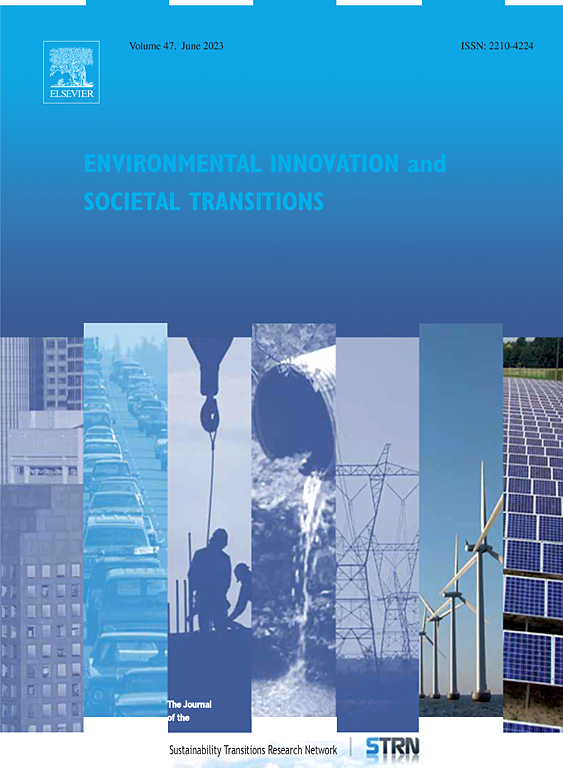肯尼亚离网太阳能电子废物的冬眠:对新出现的废物问题的无意回应
IF 5.7
2区 经济学
Q1 ENVIRONMENTAL SCIENCES
Environmental Innovation and Societal Transitions
Pub Date : 2024-10-31
DOI:10.1016/j.eist.2024.100926
引用次数: 0
摘要
离网太阳能设备实现了向绿色能源的过渡。然而,在过渡的同时,也产生了电子垃圾,其管理也令人担忧。目前,大多数太阳能电子垃圾都 "冬眠 "或存放在家中,只有一小部分被回收利用。通过混合方法,本文探讨了 "冬眠 "的根本原因。它建立了一个新的框架,以揭示经济、情感和象征性原因之间的相互作用,从而解释肯尼亚农村家庭中太阳能电子垃圾的冬眠现象。研究发现,72% 的废弃物会冬眠,而冬眠的可能性会随着经济价值的降低、象征意义和情感意义的增加而增加。随着设备的老化,冬眠期预计会延长。因此,虽然更好的产品、维修和回收利用是长期解决方案,但冬眠为破损设备问题提供了一个 "无意 "的中间解决方案,否则这些设备可能会被丢弃。本文章由计算机程序翻译,如有差异,请以英文原文为准。
Hibernation of off-grid solar e-waste in Kenya: An unintended response to an emerging waste issue
Off-grid solar devices enables a transition to green energy. With this transition however, there is generation of electronic waste and concerns about its management. Currently most solar e-waste ends up 'hibernating' or stored at home, while only a minor share is recycled. Through a mixed method approach, this paper addresses underlying causes of hibernation. It develops a new framework to shed light on elements at the interplay between economic, emotional and symbolic reasoning explaining off grid solar e-waste hibernation in rural homes in Kenya. It finds that 72 % of waste hibernates and that the hibernation potential increases with decreasing economic value and with increasing symbolic and emotional meanings. Hibernation period is anticipated to increase with an ageing stock of devices. Thus, while better products, repair and recycling are long-term solutions, hibernation offers an 'unintended' intermediate solution to the problem of broken devices, which might otherwise be disposed of.
求助全文
通过发布文献求助,成功后即可免费获取论文全文。
去求助
来源期刊

Environmental Innovation and Societal Transitions
Energy-Renewable Energy, Sustainability and the Environment
CiteScore
13.60
自引率
19.40%
发文量
90
审稿时长
56 days
期刊介绍:
Environmental Innovation and Societal Transitions serves as a platform for reporting studies on innovations and socio-economic transitions aimed at fostering an environmentally sustainable economy, thereby addressing structural resource scarcity and environmental challenges, particularly those associated with fossil energy use and climate change. The journal focuses on various forms of innovation, including technological, organizational, economic, institutional, and political, as well as economy-wide and sectoral changes in areas such as energy, transport, agriculture, and water management. It endeavors to tackle complex questions concerning social, economic, behavioral-psychological, and political barriers and opportunities, along with their intricate interactions. With a multidisciplinary approach and methodological openness, the journal welcomes contributions from a wide array of disciplines within the social, environmental, and innovation sciences.
 求助内容:
求助内容: 应助结果提醒方式:
应助结果提醒方式:


